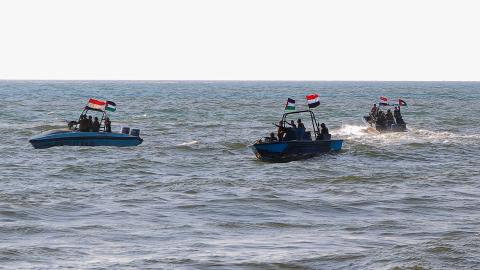For several weeks now the Iranian-backed Houthi militia in Yemen have been attacking commercial shipping and international warships in the Red Sea.
According to US Central Command, there have been almost 30 attacks involving anti-ship cruise missiles, armed drones, and hijackings. The targets of most of these attacks have been civilian vessels from countries that have nothing to do with the Israeli war on Gaza, which is the Houthis’ purported pretext.
Houthi attacks against shipping in the region are nothing new. At the height of the conflict in Yemen’s in 2016, the militia fired missiles at a US Navy warship near the Bab El-Mandeb, the strait that connects the Red Sea to the Gulf of Aden. Houthi forces also have deployed mines along Yemen’s coast and used a remote-controlled boat packed with explosives in an unsuccessful attack on the Yemeni port of Mokha in 2017. The Houthis have also launched several naval attacks against ships in the Red Sea, including gunboats that damaged a Saudi oil tanker near the port of Hodeidah in 2018.
However, in recent weeks the Houthis have stepped up their attacks to unprecedented levels and intensity. If these attacks continue unabated, the impact will be felt regionally and globally.
The Red Sea is one of the most important shipping lanes in the world. Some estimates are that 15 percent of global maritime trade passes through it, including almost a third of global container traffic. At a time when energy markets are already in flux, Red Sea maritime traffic includes 8 percent of global liquefied natural gas trade and 12 percent of seaborne traded crude oil. On average, about $2.7 billion worth of trade passes through the Red Sea each day, equivalent to the annual gross domestic product of the Central African Republic.
As international shipping companies reroute around the Cape of Good Hope away from the Red Sea, the increased delay in shipping times will mean higher prices for consumers around the world. At the same time, low water levels created by a regional drought are causing shipping delays in the Panama Canal. The Northern Sea Route, along Russia’s Arctic coastline connecting Europe with Asian markets, is not becoming the viable alternative to the Suez Canal that some had thought. Land trade routes, such as the so-called Middle Corridor through the South Caucasus, will be increasingly used but do not have nearly the same capacity as maritime trade.
The countries around the Red Sea are affected as well. A large majority of Jordan’s food imports are from ships transiting the Red Sea to the port of Aqaba. Already there has been a decline in imports through Aqaba. Meanwhile, Egypt depends on the transit fees it levies for use of the Suez Canal. Last year, these fees accounted for 2 percent of Egypt’s GDP. In recent weeks transits through the canal have decreased by 20 percent.
Slowly, the international community is starting to mobilize a response to the Houthi attacks. Last month, the US, Australia, Bahrain, Belgium, Canada, Denmark, Germany, Italy, Japan, Netherlands, New Zealand, and the UK set up Operation Prosperity Guardian, a naval task force deployed in the Red Sea to protect commercial shipping.
This is not the first time in recent years that the international community has established a naval coalition for the region. Between 2009 and 2012, Somali pirates operating off the Horn of Africa, just a few hundred kilometers south of where the Houthis are threatening maritime traffic today, caused an upheaval in global shipping. In response, an international counter-piracy coalition deployed to fight the Somali pirates. As the international community looks to establish maritime security in the Red Sea, lessons should be learned from the counter-piracy operations more than a decade ago.
The first lesson to learn is that there must be a simple and streamlined chain of command. During the counter-piracy operations off the Horn of Africa, there were several international missions ( for example, Combined Task Force 151, a NATO led mission, and a separate EU-led mission) which often caused confusion and ineffectiveness. There was no single overarching commander and the rules of engagement differed from one mission to the next.
Second, maritime security operations cannot be fought only at sea. It is understandable that countries do not want a major region-wide war to break out. However, if security in the Red Sea is to be restored, the command nodes and logistics infrastructure in Yemen facilitating attacks on international shipping must be taken out. This was also the case when pirate sites were struck in Somalia. Any notion that a successful maritime security operation will be limited to the sea is hopelessly naive. As long as these strikes are carried out in a surgical and deliberate manner, the risk of war spreading will remain limited and deterrence will be restored.
Third, regional countries should be involved. Although Operation Prosperity Guardian is US led, regional countries have the most to lose if security in the Red Sea deteriorates. Luckily, for the past 20 years, the US Navy has invested heavily in improving the maritime capabilities of some regional countries. Bahrain, Egypt, Kuwait, Qatar, and the UAE have participated in, and in some cases have commanded, different maritime security operations in the Gulf, Red Sea and Horn of Africa. Security in the Red Sea cannot become a US or European dominated issue.
The free flow of shipping through the Red Sea should be a priority for the international community. The economic consequences arising from a major disruption of supplies would ripple across the globe. Commercial and civilian ships are never a legitimate target for anti-ship cruise missiles and armed drones. Holding the crews of these ships hostage is modern day piracy. This is unacceptable. This must be made crystal clear, using actions and not just words, to the Houthis and their regional backers.















